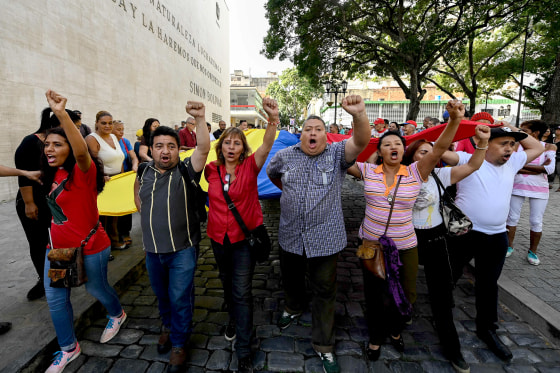Venezuela is only second to Syria in the numbers of "displaced persons" living outside their native country but the refugee humanitarian crisis in the South American nation has largely faded from the world's attention. A philanthropic group wants to change that.
The exodus of Venezuelans leaving their country hasn’t stopped and neither has the urgent need for help, according to Hispanics in Philanthropy. The group recently launched a bilingual crowdfunding platform to support nonprofit organizations working with Venezuelan refugees in Colombia, Ecuador, Peru, Brazil and the U.S.
Venezuelans Moving Forward, and the Spanish-language Venezolanos Adelante, as the platforms are called, include community-led fundraising programs or “digital giving circles,” and matching grants to support Venezuelan refugees through grants to organizations that are helping them. HIP vets the organizations that are able to provide funds and gives the groups a platform to present themselves to a wider audience.
The wave of Venezuelans leaving their country is considered the largest in the recent history of Latin America and the Caribbean, according to the United Nations.
Already, 4 million Venezuelans have left the South American country, with the Organization of American States [OAS] predicting that the number could reach as high as 8 million by next year.
The bulk of the refugees are fleeing to neighboring Colombia, which does not have the resources to absorb them. There are 1.4 million Venezuelans in Colombia and that number is expected to rise to 3 million by 2021 if the current crisis is not resolved, according to Colombian government projections.
Countries such as Ecuador and Peru have been less receptive to Venezuelans, enforcing stricter policies for migrants, and deporting those who enter illegally.
In the U.S., the Venezuelan immigrant population has almost doubled since 2010 to more than 350,000, according to U.S. Census figures. They now comprise the No. 1 group claiming asylum in the U.S. Yet, migrants arriving in the U.S. from Venezuela generally receive significantly lower financial support from the philanthropic community compared to other refugee groups.
Venezuelan refugees are facing the same obstacles throughout the hemisphere. A recent OAS report found that the philanthropic response to the Venezuelan refugee situation has been “insufficient,” with $5,000 in funding granted per Syrian refugee, compared to less than $300 per Venezuelan refugee.
“The needs and dangers faced by Venezuelan refugees grow greater with each passing day,” Nancy Santiago Negrón, HIP's vice president, said. The organization also brings together a network of other nonprofits, foundations and funders for a variety of humanitarian projects.
“The reaction from the philanthropic community was slow until HIP and others were able to help highlight the huge discrepancy in funding for Venezuelan refugees,” Santiago Negrón told NBC News.
“Now we are hearing from foundations who are proactively reaching out to see how they can help.” The goal, Santiago Negrón added, is to create parity for Venezuelan refugees.
Among other efforts, the New York-based Tinker Foundation, one of the groups involved in aid to Venezuelan refugees, is providing up to $5,000 in matching funds for donations to help Venezuelan refugees. Venezuelans in the U.S. say help is also needed right here, from assistance with housing and other necessities, to legal help in their quest to gain asylum.
This type of philanthropic initiative is made even more important, activists say, because neither the U.S. Senate nor the Trump administration have moved on granting Temporary Protected Status (TPS) to Venezuelan refugees living in the U.S. TPS was enacted in the 1990s to grant legal status on a temporary, two-year renewable cycle to immigrants from certain countries who were fleeing natural disasters or conflicts.
“As we watch this crisis on Venezuelans unfold, we decided that we need to act,” Caroline Kronley, president of the Tinker Foundation, said.
“This is a long-term situation that we have to face in our hemisphere,” Kronley said, adding that individuals can help as well. “There are really concrete things that people can do even with a small amount of money to respond to this problem that will make an enormous difference.”
Follow NBC Latino on Facebook, Twitter and Instagram.

